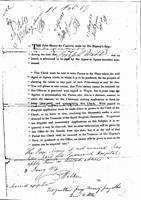|
|||
|
As stated in Chapter 2, no christening
record has been found for this son of William and Martha, so
how do we know of his existence and how can we be sure that we
are tracing the same man? Firstly, the Indenture click here for transcription
Whoever wrote the note on the back of the Prize Money document
When he joined HMS Audacious, Joseph was technically a Volunteer and entitled to the King's Bounty. Joseph remained with HMS Audacious until 1801, having been promoted to Ordinary Seaman in October 1797. During his time with that ship, various captures were made and he was later able to claim his share of the Prize Money (Ref 3).
In February 1801, Nelson changed his plans and moved to HMS St George, a 98-gun vessel. Joseph moved with him and remained on the St George until June 18th of that year. Joseph therefore saw action at the Battle of Copenhagen on April 2nd and he may later have been entitled to a Service Medal (these were awarded in the 1840s, but we do not know whether Joseph was still alive then). Just before the battle Nelson moved yet again, this time to HMS Elephant which had a lesser draught. Not only was Ordinary Seaman Joseph Webb on the same vessel as Lord Nelson on more than one occasion, he became closely involved with the great man. After the Battle of Copenhagen, Nelson returned to HMS St George and then to the smaller HMS Kite, sailing into Yarmouth on June 30th. The muster roll of HMS Kite shows Joseph Webb listed as a servant, along with a steward, a valet and a cook. Somehow Joseph must have come to Nelson's attention and was retained as a member of his personal staff. Family tradition has, therefore, been shown to be true, but did Joseph ever serve on HMS Victory? On his arrival at Yarmouth, Joseph transferred immediately (June 30th) to HMS Medusa (a 32-gun frigate) as part of the Admiral's retinue. Nelson joined the ship after a period of shore-leave but then moved his flag to HMS Amazon, a 38-gun frigate which Joseph joined on August 27th. Joseph's career seems to come to an abrupt end on November 28th 1801 when he was discharged as a domestic in Nelson's service. Joseph, along with a James Bell, were both described as being "unserviceable" - did this mean unfit through injury, perhaps incurred in battle? Nelson did not take over HMS Victory until 1803 and the battle of Trafalgar was not until 1805, so did Joseph recover and rejoin to serve as a member of Nelson's personal staff, or was his discharge in 1801 the end of Joseph's naval career which he, or others, later embellished for effect? He is not listed as a crew-member on the Victory at the battle of Trafalgar but could possibly have been part of Nelson's personal retinue. Whatever might be discovered in the future, we at least know that Joseph Webb was personally acquainted with Admiral Lord Nelson and that he saw action at the Battle of Copenhagen. We can glimpse what life was like for the Ordinary Seaman during the dispute with France, which culminated in the decisive battle of Trafalgar, from contemporary accounts (Ref 4). What was life like back in England for the family Joseph had left behind in Beoley? The mood of the nation at the start of the 19th century can be compared to that of 1940 - the threat of invasion by sea was very real. In 1940 Hitler's threat only lasted for that summer but Napoleon's bid lasted from 1797-1805 (apart from the short-lived Peace of Amiens). During these years the general population was arming itself, much in the way of the later "Dad's Army", with pitchforks and other implements. They drilled on village greens and patrolled the coastline in fishing boats. Naughty children were threatened with the thought that "Boney" would get them. Everyone was in fear of the possibility of Frenchmen lurking in the darkness. In 1940 Hitler's invasion by sea did not come to pass because he lost control over the skies at the Battle of Britain; Napoleon abandoned his plans to invade after the Battle of Trafalgar. We do not know what became of Joseph, but his family must have been proud to relate that he had personally known the hero of the hour, Admiral Lord Nelson. |
 shows that Joseph was the son of William
Webb of Beoley and that he was apprenticed as a papermaker to
James Holyoake of Tardebigge for the usual period of seven years.
The Indenture is dated 1785 but does not state Joseph's age at
that time - only from later information has it been established
that he was about ten years old. An Indenture was so called as
is was originally a two-part document which was split or cut
with a serrated edge to give a copy to each party i.e. the father
of the apprentice and the employer. It is worth studying the
conditions of employment as they give some insight into the life
of an apprentice in the reign of George III (
shows that Joseph was the son of William
Webb of Beoley and that he was apprenticed as a papermaker to
James Holyoake of Tardebigge for the usual period of seven years.
The Indenture is dated 1785 but does not state Joseph's age at
that time - only from later information has it been established
that he was about ten years old. An Indenture was so called as
is was originally a two-part document which was split or cut
with a serrated edge to give a copy to each party i.e. the father
of the apprentice and the employer. It is worth studying the
conditions of employment as they give some insight into the life
of an apprentice in the reign of George III (
